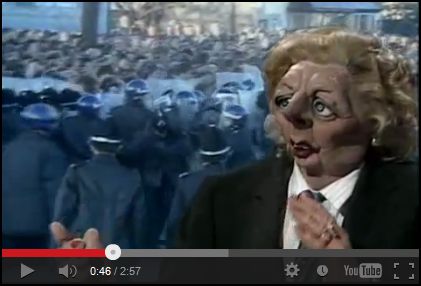It was never going to be a quiet occasion. Margaret Thatcher’s death would always be a reminder of all the things that she did (“accomplished” for some, “perpetrated” for others) whilst she was Prime Minister, all 11 years of it, of the United Kingdom.
Those who had been mostly affected by her neoliberal revolution came out on a rainy Saturday to express their disapproval of her policies. Perhaps she was unlucky enough to die so close to the day many regard as the re-enactment of the worst of her legacy: the onslaught on benefits for the poor, the disabled, the sick and the ill-fated, announced by the present government, the Thatcher’s heirs. Students and Unions, were there too, targets of a system that dehumanises and discriminates.
She had been a disciple of Friedrich Hayek, the Austrian-British economist who in 1974 shared the Nobel Prize in Economics with the left leaning Gunnar Myrdal, apparently to “balance” his ideology. Hayek inspired Thatcher, Chirac, Reagan and the “Chicago Boys” in the 70s to produce the most radical destruction of the unions, workers rights, banking regulations, limitations to international financial institutions and shrinking of the state through privatisation of production, health, education, housing, etc.
This “liberalisation”, done in the name of “freedom” led to the excesses and concentration of wealth, mainly through speculation rather than production, which are at the root of the present economic crisis the world has been going through since 2007.
Thatcher shared also with Hayek an admiration for the genocidal mass murderer Chilean dictator Augusto Pinochet, and they actively sought to help his regime by masterminding the economic policies that were to be implemented in Chile. That legacy is also still poisoning the lives of ordinary people in the southern country.
Was she a good role model for girls? Did she encourage other women to enter politics? Perhaps. Her style of leadership was not particularly “feminine” and she was called by many an honorary man, but she was admired for breaking many moulds. Let us hope that her singlemindedness and disregard for other people’s lives, e.g., sinking the Belgrano out of the exclusion zone, are not seen by women as a good example to follow.
Some newspapers dared bring out links to “Ding Dong the Witch is Dead” and an old TV programme, Spitting Image, depicting at one point Thatcher in nazi uniform during a spoof of the Jerusalem Hymn according to the policies of her government.
UK Uncut went out with Who Wants To Evict A Millionaire? to highlight the new bedroom tax for the poor, and that “we are told that the only way to reduce the deficit is to cut public services. This is certainly not the case. There are alternatives… [e.g.] to clamp down on tax avoidance by corporations and the rich and tax evasion, estimated to cost the state £95bn a year”. The deregulation from the Thatcher era created the conditions and removed the moral constraints to pursue this greed sans frontiers.
Her family, friends, admirers, sycophants, elected officials who feel they have to show respect pour la galerie and members of the Royal family (the Queen!) will be out in force for her Wednesday funeral with full military honours.
How do we reconcile with those who harm us and others so that they stop poisoning our feelings, preventing us from creating a new world based on compassion and solidarity?
It is not a matter of forgiving or forgetting because we need our memory to do something different and we need to understand the compulsions that led people through fear, through a need to compensate whatever inhabited their formation landscape to undertake actions that hurt others. If we cannot see that in other people’s actions we will not see them in our own. The mistakes of the past are catching up with the system now. Two roads open before us: to wallow in resentment and revenge or to learn from the past and create a different future.






